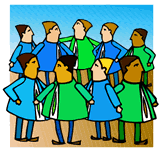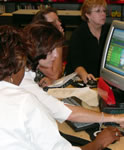The teacher librarian must develop collaborative relationships throughout the learning community. These partnerships are critical to the success of the library media program
 Running a library media program involves collaboration with students, teachers, parents, and local community members.
Running a library media program involves collaboration with students, teachers, parents, and local community members.
An effective center administrator must coordinate programs and people, in addition planning and managing time, resources, and facilities. They must also be leaders and advocates for learning. These roles all require working with others to build a positive atmosphere of cooperation and mutual respect.
What areas of the library media program involve collaboration?
Whether your integrating information literacy into the curriculum or developing a reading promotion, collaboration is essential throughout the library media program.
 Watch examples of collaboration from the 2002 Collaboration Grant Projects from the Indiana Department of Education.
Watch examples of collaboration from the 2002 Collaboration Grant Projects from the Indiana Department of Education.
(Go to the Real website to download a free player. Scroll to the bottom of the page (or in the upper right hand corner) and download the FREE player, NOT the 14 day trial player. It's available for both Windows and Macs.)
![]() Read Chapters
1, 2 & 3 - Collaboration and the School Media Specialist by
C. Doll. Read the remainder of the text next
week.
Read Chapters
1, 2 & 3 - Collaboration and the School Media Specialist by
C. Doll. Read the remainder of the text next
week.
How are collaborative partnerships formed?
Think of collaborative partnerships as the process of developing a trusting relationship between two or more professional colleagues. Collaborative relationships are enabled by recognizing the varied roles served by individuals of the learning community (including the teacher librarian), modeling desired practices, acting proactively, and providing personal experience and expertise.
Connecting with the teachers, school administrators, public librarians, and other members of the community help a library media specialist building strong programs. In addition, library media specialist must form relationships with other professional educators and librarians for advocacy, buying power, professional development, and curriculum development.
![]() Begin
with reading T. Buzzeo's Disciples
of Collaboration. School Library Journal. Sept. 2002; 48(9),
34. (Access requires login)
Begin
with reading T. Buzzeo's Disciples
of Collaboration. School Library Journal. Sept. 2002; 48(9),
34. (Access requires login)
Also read these related articles:
Haycock,
K. Research
About Collaboration. Teacher Librarian, Feb. 2000; 31(2).
Milbury, P. Collaboration:
Ten Important Reasons to Take It Seriously. Knowledge
Quest, May/June 2005; 33.
Montiel-Overall, P. Toward
a Theory of Collaboration for Teachers and Librarians. School Library Media Research, 2005; 8.
Consider making logical connections such as the reading and language arts. Then focus on ways to build inquiry-based activities into other areas.
Read (1) Position
Statement on Resource Based Instruction: Role of the School Library
Media Specialist in Reading Development and (2) Position
Statement on the Value of Independent Reading in the School Library
Media Program Development from American Association
of School Librarians.
Read Collaboration web
modules at Teacher-Librarians . . . Supporting Student Learning from
Central iSchool, CA.
How are relationships formed with teachers?
Some library media specialists find it easy to connect with classroom teachers, while others find this networking difficult. The key is identifying an approach that fits your personality. In some cases, a formal approach of scheduling meetings, structured partnerships, and joint planning is effective. In other cases, teacher librarians are more successful through informal friendships formed in teacher lounges, before faculty meetings, and in the hallways. The key is being receptive and proactive in making connections of all kinds.
![]() Read Heard
It Through the Grapevine by G. Hartzell in School
Library Journal, Sept 2003; 49(9), 41. (Access
requires login)
Read Heard
It Through the Grapevine by G. Hartzell in School
Library Journal, Sept 2003; 49(9), 41. (Access
requires login)
Also read America's
Most Wanted: Teachers Who Collaborate by C. Brown in
Teacher Librarian, Oct 2004; 32(1), 13. (Access requires login)
This article identifies the factors that contribute to a successful
collaboration between teacher-librarians and classroom teachers.
What connections can be made with principals?
A teacher librarian and the school principal must develop a strong relationship. The principal must be aware of your interest in being involved in all aspects of the curriculum. Many administrators aren't aware of the skills of today's school library media specialist and their interest in leadership, collaboration, and technology.
Read Principal’s Manual Brochure from American Association of School Librarians (PDF Document). Consider sharing this brochure with your principal; it's a good place to start a discussion.
How can the school library and public library collaborate?
There are many opportunities to bring the school and public library together.
![]() Read School
and Public Library Relationships: Essential Ingredients in Implementing
Educational Reforms and Improving Student Learning by
S. Fitzgibbons in School
Library Media Research, 3, 2000. This paper explores the range of successful,
cooperative relationships between public libraries and school library
media centers.
Read School
and Public Library Relationships: Essential Ingredients in Implementing
Educational Reforms and Improving Student Learning by
S. Fitzgibbons in School
Library Media Research, 3, 2000. This paper explores the range of successful,
cooperative relationships between public libraries and school library
media centers.
Read Come
Together by J. Jones in School Library Journal,
March 2004; 50(3), 45. (Access requires login) School
and public librarians need to join forces for kids’ sake.
How do we show that our programs are effective?
We must be able to show evidence of our collaboration, leadership, and use of technology.
There are many ways to collect data. One way is by documenting your work with teachers. Explore some of the following Collaborative Planning Forms:
- Collaborative Program Planning and Teaching from Teacher Librarian
- Collaboration Forms from QVSD
- Collaborative Planning Forms from Indiana Learns
![]() Read Does
Collaboration Boost Student Learning? by B. Lange,
N. Magree & S. Montgomery in School Library Journal,
June 1, 2003; 49(6), 4. (Access requires login)
Read Does
Collaboration Boost Student Learning? by B. Lange,
N. Magree & S. Montgomery in School Library Journal,
June 1, 2003; 49(6), 4. (Access requires login)
Words of Wisdom
Whether co-producing an instructional unit or partnering on a reading initiative, collaboration takes planning.
 Read about the collaborative efforts of one library media specialist:
Read about the collaborative efforts of one library media specialist:
I've got a collaboration planning sheet that is
posted at the Indiana Learns site: IN
Collaborative Planning Sheets.
In the September issue 2004 of School Library Journal (Vol
50, Issue 9, p50),
you'll find an article (The
Rookie) I've written about
how young School Library Media Specialists can work with veteran teachers.
Carl A. Harvey II
Library Media Specialist, North Elementary School
& President, Association for Indiana Media Educators carl_harvey@mail.nobl.k12.in.us
North Library Media Center Webpage
http://www.nobl.k12.in.us/media/NorthMedia/index.htm
Check Your Understanding
![]() Information
Power - Learning and Teaching: Principle 3.
Information
Power - Learning and Teaching: Principle 3.
The library media specialist
models and promotes collaborative planning and curriculum development.
(p. 4)
![]() Information
Power: Program Administration - Principle 6.
Information
Power: Program Administration - Principle 6.
An effective library media
program requires ongoing administrative support. (p. 100, 108)
Describe a project you might coordinate as a library media specialist. Brainstorm the different partners that might be involved with the projects. Discuss how you would you get these people involved with your project. How would you approach the potential partners?
Make It Real
 Explore the collaborative planning sheets found online. Combine elements of different sheets to build your own form. Be sure to cite the resources you used at the bottom of your form. Create a sample completed form using information from your experiences or a project you find online. If you are currently working in a library media center, try out the form and see what you think. Then, discuss why you think this form would be effective.
Explore the collaborative planning sheets found online. Combine elements of different sheets to build your own form. Be sure to cite the resources you used at the bottom of your form. Create a sample completed form using information from your experiences or a project you find online. If you are currently working in a library media center, try out the form and see what you think. Then, discuss why you think this form would be effective.
Read More About It
Classroom and Library Collaboration
http://www.forks.wednet.edu/high/Library/
. . . /Collaborationpg1.HTM
Links to several forms for collaborative planning and assessment.
Collaborative Planning in the Community for
Library Media Centers and Technology Programs (p. 26-55) from
Indiana Learns
http://www.indianalearns.org/collaborative.asp
Collaborative planning is defined as the teaming of teachers, library media specialists, and technology specialists to create exciting learning experiences that take advantage of the information-rich and technology-rich environment of the school.
Collaborative Planning Guide from South Carolina Department of Education (Word document)
http://www.myscschools.com/
. . ./documents/Collaborative_Planning_Guide.doc
Gustafson, C. If You Give a Teacher a
Cookie. School Library Journal, Feb 2003; 49(2), 45. (Access
requires login)
http://search.epnet.com.proxy.ulib.iupui.edu/login.aspx?direct=true& .
. .
Explains a strategy to win the hearts and minds of colleagues.
Joint-Use Public/School Library Standards from State Library of Queensland, Australia
http://www.slq.qld.gov.au/serv/publib/policy/guidelines/thirteen
King, S.V. The Job I Really Need to Do.
Knowledge Quest, 31(2), Nov./Dec. 2002.
http://www.ala.org/ala/aasl...
Library Monthly Update from Baltimore County Public Schools
http://www.bcps.org/offices/lis/office/admin/forms/librarymonthlyupdate.pdf
Kevin Finkle of Seneca Elementary developed this form to get input from teachers regarding classroom teacher's instructional plans for literature, science, social studies, etc,
Piazza, S. Understanding Students' Home Cultures: The Teacher-Librarian as Collaborative Partner. Teacher Librarian, 28(4), Apr. 2001.
http://www.teacherlibrarian.com/tlmag/v_28/v_28_4_feature.html
Merging understanding of home and school cultures through the PhOLKS project can assist learning.
Policy on Public Library and School Library Cooperation from Massachusetts Board of Library Commissioners
http://mlin-prod.beacontec.com/advisory.../apes02.php
Schomberg, J. TAG
Team: Collaborate to Teach, Assess and Grow. Teacher
Libarian, Oct,
2003; 31(1).
http://www.teacherlibrarian.com/tlmag/v_31/v_31_1_feature.html
Shayne, R. Teachers and Librarians: Collaborative Relationships. ERIC Digest, ED444605. ERIC Clearinghouse on Information and Technology, Aug. 2000.
http://www.ericdigests.org/2001-2/librarians.html
Defines collaboration, conditions favorable to collaborative partnerships, and references and suggested readings.
Small, R. Collaboration:
Where Does It Begin? Teacher Librarian, June 2002; 29(5).
http://www.teacherlibrarian.com/tlmag/v_29/v_29_5_feature.html
Teacher Librarian Collaboration (TLC). Sadie Tanner Mossell Alexander:
University of Pennsylvania Partnership School.
http://www.libraries.phila.k12.pa.us/pennalexander/TLC.html
Teacher Librarians . . . Supporting Student Learning.
Central iSchool. Saskatchewan, CA.
http://wblrd.sk.ca/~teachlib_dev/index.htm
These modules explore components critical to the role of teacher-librarians
as instructional leaders
Teachers & Teacher-Librarians: Effective Partners
in Education (PDF document)
http://www.bctf.bc.ca/PSAs/BCTLA/Teachers_and_TLs.pdf
This Canadian brochure was written for student teachers, but could be adapted
for use with teachers.
McKenzie, J. Reaching the Reluctant Teacher. From Now On, 1999.
http://www.fno.org/sum99/reluctant.html
Administrator Cooperation
Bush, G. Library
Q & A: What Board Members Should Know About School Libraries . .
. But Seldom Ask. American School Board Journal, June
2005; 192(6).
http://www.asbj.com/2005/06/0605ASBJbush.pdf
Black, S. Research:
Reading Room. American School Board Journal, Feb. 2001; 188(2).
http://www.asbj.com/2001/02/0201research.html
Article about libraries and librarians. Note: mediocre... however the articles might be used as reading for a debate on the issues.
School Libraries for Lifelong Learning: A Handbook for Administrators from University of Prince Edward Island, Canada
http://www.upei.ca/~fac_ed/projects/handbook/index.htm